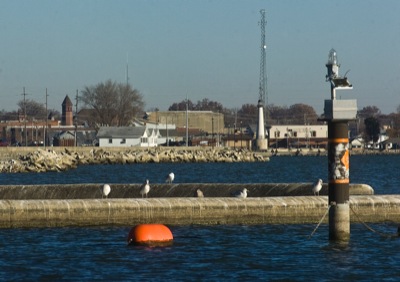Thursday, November 14th, 2013
State intends to pay landowners but fight amount
Lake spillway flooding suit decision appealed
By Kathy Thompson

Photo by Mark Pummell/The Daily Standard
Several landowners blame increased flooding of their land on the Grand Lake's West Bank spillway owned by the Ohio Department of Natural Resources.
The state says it fully intends to pay landowners in Mercer County for flood damage due to Grand Lake's West Bank spillway as ordered by the Ohio Supreme Court.
But not without a fight over the dollar amount.
"We're responsible for taxpayers' money," said Mike Williams, special counsel for the Ohio Department of Natural Resources. "That's why, with all due respect, we are appealing the juries' decisions in the cases that have been presented. We are fiscally responsible to the taxpayers and need to work in their best interest."
ODNR has filed a motion for an amended petition in at least one lawsuit from earlier this year that awarded a local couple, Gale and Nelda Thomas, $363,000. The state also is appealing another lawsuit by David Karr, who was awarded $631,000 by a Mercer County Common Pleas jury. The Karr appropriation trial is scheduled for Dec. 19, court records show; the Thomas trial is scheduled for March.
The attorney for the Thomas and Karr families says ODNR is "dragging their feet," and has twice been found to be guilty of violating the landowners constitutional rights.
"They're just plain refusing to do what is right and fair," attorney Thomas Fusonie said. "These families continue to have flooding on their property and the state just continues to drag their feet."
The cases are among a long line of lawsuits, more than 50, that were filed against the state in 2009 that sought compensation for flooded land along Beaver Creek and/or the Wabash River. Appropriation trials are scheduled in Mercer County Common Pleas Court for the end of this year and into next year.
Landowners Wayne and Janet Doner, the first local residents to sue the state, were awarded $1.9 million for 222 acres. Their land has been recorded as a permanent state flowage easement, which means the state declared eminent domain on the property to offer a fair market value and pay damages for the property. The state did not appeal that verdict.
The landowners blame increased flooding of their land on the Grand Lake's West Bank spillway, which is owned by ODNR. The 500-foot-long spillway was opened in 1997, replacing the original 39-foot-long spillway built in 1913. The old spillway was replaced because a dam study showed it was in danger of overtopping. Property owners say the larger spillway lets out more water at a faster rate.
The landowners also contend their land is subject to continuing, persistent, frequent and inevitable increased flooding from the spillway since the state elected not to open either of the spillway's two water outlet tubes to manage the lake's water level.
In March 2012, the state opened one of the two tubes at the base of the spillway to let water out. It was the first of an undetermined number of pilot tests to develop a water level management protocol for the lake.
The Ohio Supreme Court ordered ODNR to pay the landowners, but Fusonie said ODNR just keeps delaying the issue and will not offer the landowners a settlement that is fair.
"Their land just keeps flooding over and over again," Fusonie said. "The juries come back and order the state to pay three, sometimes even four times what the state has been willing to offer. Time and time again they have been found in contempt of court. They were suppose to make deposits to the landowners, but it's just been delay after delay. They are just refusing to do the most basic things."
Earlier this year, Gov. John Kasich brought up the issue during a visit in New Bremen, saying state money for the lawsuits could take away funds used to treat Grand Lake. Kasich said reasonable settlements are fine, but there's a limit to how much money should be spent.
The state funded two alum treatments on the lake in 2011 and 2012 at a cost of $8.4 million. Farmers have been cooperating with state officials in attempts to prevent manure runoff that causes algae blooms. The phosphorus in the manure feeds toxic blue-green algae in the lake.
Williams said Kasich has not put any pressure on his office to reach lower settlements. He also noted that what the Ohio Supreme Court did not do is determine how much more frequently the landowners' properties flood, how much larger of an area floods on the properties and how much longer the flooding lingers on their land.
ODNR has in the past year conducted "voluminous research and hired new experts" including a hydrologist and a real estate appraiser, according to Williams.
ODNR states in the amended petition filed Nov. 8 that using the 2003 flood, while an extraordinary event, did not require the state to take a flowage easement. The petition also states that a flowage easement is required to be taken for events that are intermittent, but inevitably recurring, with sufficient frequency to constitute an interference with the property. An event that will occur less frequently than once every 10 years is not of sufficient frequency to constitute a taking, the petition states.
"Using the 10-year event, the impacted acres are 20 hours of water every 10 years," Williams said. "ODNR admits the impact is measurable, but we still need to protect the taxpayers' interest and money."
Fusonie said the state is not seeking to "cure a defect or informality." Instead, he states in a brief filed in opposition that the state is seeking to reverse the decision of the Supreme Court and to flout (ignore) the high courts' contempt order that required ODNR to file eminent domain actions to take flowage easements to the 2003 flood elevation on all but 20 parcels.
"ODNR sweeps its contempt under the rug and wants to start all over again and litigate issues already conclusively decided against it by this state's highest court," the brief states.
Fusonie said the state is showing a "disturbing contempt for the Supreme Court and Mercer County citizens who sit on the juries and disagree with ODNR on what is fair and "just compensation for ODNR's permanent seizure of the right to flood land at any time, for any length over and over until the end of time."




